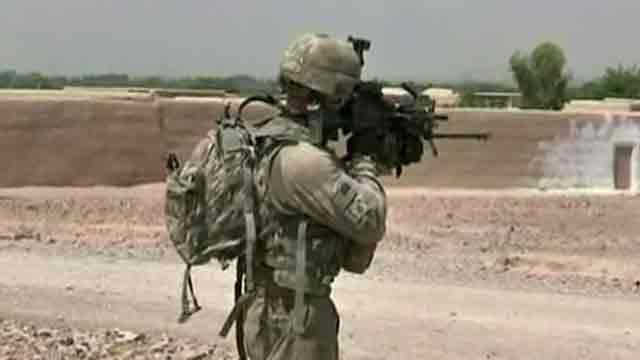"Sequestration". It's something that sounds more like what you'd do to a horse on the way to the glue factory, than the president's plan to cut federal spending.
When you cut away all the Washington-speak, sequestration requires automatic across-the-board cuts to defense and non-defense domestic programs starting March 1 unless the president and Congress come up with a new plan.
The original idea when the sequestration bill was passed in 2011 was the cuts would be so unpalatable to Republicans and Democrats that they'd get their act together in time to find another solution. It was a "Mutually Assured Destruction" plan so devastating it would never be implemented.
It hasn't happened. Both sides are still as far apart as ever.
So what happens to the Department of Defense if these automatic cuts kick in? The last two Secretaries of Defense -- both highly respected on both sides of the political aisle -- say the proposed defense cuts will be catastrophic. The chairman of the Joint Chiefs of Staff says the same.
[pullquote]
Nevertheless, defense spending will be cut. And it should be. The Iraq war is over and the Afghan war winding down. We're unlikely to fight big land wars in the Middle East or elsewhere for a long time.
The masses of civilian employees and consultants we hired after September 11 are a layer of bureaucracy we don't need and can't afford. We will also cut into the bone. We will hollow out the force, cut back on training and maintenance, and give up certain missions.
But that's where we should stop.
The one thing Americans should not do is balance our books on the backs of our veterans and wounded warriors. We did this after the Vietnam War, and it was a permanent stain on the soul of America. We punished our veterans for an unpopular war. Not only did we spit on them when they returned home, we cut their pay and benefits. They fought for us, and bled for us, and died for us, and we tossed them away.
One of the greatest strengths in the American system of government is civilian control of the military. We have the strongest, most powerful military in the history of the world, but it bends unquestioningly to the will of our elected officials.
Our military leaders don't seize power in coups; our soldiers and sailors don't go on strike for higher pay or benefits; our armed forces don't weigh in on the political process. In return, Americans have a sacred duty to treat them honorably. As usual, Lincoln said it best. We must "care for him who shall have borne the battle, and for his widow, and his orphan."
We haven't always lived up to this responsibility.
I saw this first hand in 1981 when the Reagan administration came into office. When we arrived at the Pentagon we were horrified by what we found after a decade of neglect. We had ships that couldn't sail because they didn't have fuel. We had planes forced to sit grounded on the runway because of pilots didn't have enough training hours to be certified. For every tank that worked, we had one sitting right next to it that was cannibalized for spare parts.
But worst of all was what we had done to our military men and women. We had the homeless Vietnam vets, living on the streets in wheelchairs, without adequate medical or mental health benefits. We had junior enlisted personnel who were paid so little they qualified for food stamps.
It made me ashamed to be an American.
In his State of the Union address Tuesday night President Obama said:
"We will keep faith with our veterans -- investing in world-class care, including mental health care for our wounded warriors; supporting our military families; and giving our veterans the benefits, education, and job opportunities they have earned."
Let's hope he means it, and those are not just empty words. Because as things stand now, sequestration cuts will cut military and veterans health care benefits, will reduce spending on military families and will squeeze the veterans' education and job assistance programs.
President Obama proposed the sequestration legislation, and it will be up to him to determine where the mandatory defense department cuts come from.
So far he's declared that 'military personnel accounts' will be exempt from the cuts. What that means is military pay will not be cut, but related programs like medical benefits, the GI-bill, drug abuse counseling, and post-military job assistance programs are eligible for automatic reductions.
We all know there are tough times coming for us all. We will all be asked to tighten our belts. But the one thing we must never do again is to expect our men and women in uniform to bear the biggest share of the burden.
They may be only 1% of our population, but they bear 100% of our defense. They didn't ask for those multiple deployments, for the strain on their families, for the physical and mental injuries many will bear for the rest of their lives.
To deny them the benefits they've earned would not only be tragic for them and their families -- the 1% -- but it would also be tragic for the other 99% of Americans.
We can never let that stain come back on the soul of America.









































